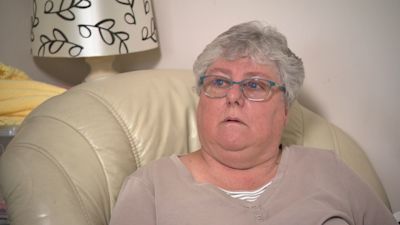Universal Credit: 'How am I going to pay for food?'

People receiving Universal Credit in Wales have said they do not know how they are going to pay for food and other bills when the £20-a-week boost comes to an end.
The Universal Credit uplift was introduced temporarily to help claimants dealing with the impacts of the coronavirus pandemic.
It is due to be phased out by the end of September, despite objections from charities and opposition political parties.
Citizens Advice has predicted that withdrawing the extra financial support next month could force 1.5 million working people in the UK into hardship, with 600,000 of those left struggling to afford food.
Carole Thomas has lived in Mountain Ash for most of her life and she entered the world of work as a 15-year-old.
Now in her 60s, Carole has had to give up working because of knee issues.
She only started claiming Universal Credit during the pandemic, which means she's always had the £20 extra.
She's worried about how she's going to pay for food once the uplift is gone.
"I've always worked and I've always had money coming," Carole explained.
"Now I've gone onto Universal credit it's dropped completely."
"I can't do things I've always done. I can't go to the shop and buy a full week's shop.
"Where am I going to get my food from? What am I going to use to pay for it?
"Other bills that I've got, how am I going to pay for them?"
Lorry driver Colin Ridgway receives Universal Credit because of his poor health.
He described life before the £20 uplift as an impossible financial juggle, which affected his mental health.
He told ITV Cymru Wales: "It was that bad at times that I even felt suicidal. I'd virtually sold everything of value in the two-and-a-half-years leading up to that and I was thinking 'what can I do?'
"The £20 uplift was a lifeline, I could afford to eat, I could afford to pay my bills. Now it's been removed, some days I won't be able to eat.
"It's about £21 a week for my gas, electric is £7.50, you've got your water bill on top, there just isn't anything left afterwards."
Removing the £20-a-week uplift will be a "catastrophic cut" that could cause people's mental health problems to spiral, the charity Mental Health UK warned.
Visits to its online mental health and money advice service have almost doubled in a year - from 30,760 in August 2020 to 60,214 last month.
Analysis of website traffic also shows a significant rise in people seeking advice on claiming UC.
Brian Dow, chief executive of Mental Health UK, said: "These figures are a warning sign that people are struggling as vital support that has kept them afloat during the pandemic is removed when they need it most.
"This reduction in Universal Credit represents a catastrophic cut to people's incomes as they feel the impact of record inflation and soaring energy bills.
"This is not just a financial issue; we're very concerned these pressures will result in more people seeing their mental health problems spiral, in turn making it difficult to manage their money worries and sending them deeper into the red.
"It's not too late to change course. That's why we're calling on the government to drop its planned cut to Universal Credit and ensure they adopt a cross-government approach to mental health."
A Government spokesperson said: "We've always been clear that the uplift to Universal Credit was temporary. It was designed to help claimants through the economic shock and financial disruption of the toughest stages of the pandemic, and it has done so.
"Universal Credit will continue to provide vital support for those both in and out of work and it's right that the Government should focus on our plan for jobs, supporting people back into work and supporting those already employed to progress and earn more."